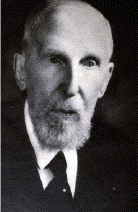January 3: Franz Cumont
Franz Cumont (1868)
It was on this date, January 3, 1868, that Belgian archaeologist and philologist Franz Valery-Marie Cumont was born in Aalst (Belgium). He studied at the Royal Athenaeum in Brussels, then at the University of Ghent, and earned his doctor of philosophy and letters in 1887 at the age of 19. By age 24 (1892) Cumont was named part-time lecturer in Philology at the University of Ghent. He was a member of academies in various European capitals and focused his study and writing on the history of the religions.
In particular, Cumont's studies of the neglected cult of the Persian sun-god Mithra illuminated the development of early Christianity. Texts and Illustrated Monuments Relating to the Mysteries of Mithra (1894-1900; Engl. trans. 1903) made his reputation. Cumont's academic position kept his public statements on religion circumspect, but his works on ancient Rome — especially After-Life in Roman Paganism (Engl. trans., 1922) — not only demonstrated his Rationalism, but corrected many false charges Christian apologists had made against the pagans.
In 1910, Baron Descamps, the Catholic Minister of Sciences and Arts at the University of Ghent, refused to approve Cumont for the chair in Roman History, in spite of the unanimous recommendation of the faculty. There was a vigorous press campaign and student agitation in Cumont's favor because the refusal was seen as blatant religious bigotry. When another candidate was named, in 1912 Cumont resigned. He died on 25 August 1947 in Brussels.
Originally published January 2004.


